Related Research Articles

Vincenzo Salvatore Carmelo Francesco Bellini was an Italian opera composer, who was known for his long-flowing melodic lines for which he was named "the Swan of Catania". Many years later, in 1898, Giuseppe Verdi "praised the broad curves of Bellini's melody: 'there are extremely long melodies as no-one else had ever made before'."

Domenico Gaetano Maria Donizetti was an Italian composer, best known for his almost 70 operas. Along with Gioachino Rossini and Vincenzo Bellini, he was a leading composer of the bel canto opera style during the first half of the nineteenth century and a probable influence on other composers such as Giuseppe Verdi. Donizetti was born in Bergamo in Lombardy. At an early age he was taken up by Simon Mayr who enrolled him with a full scholarship in a school which he had set up. There he received detailed musical training. Mayr was instrumental in obtaining a place for Donizetti at the Bologna Academy, where, at the age of 19, he wrote his first one-act opera, the comedy Il Pigmalione, which may never have been performed during his lifetime.
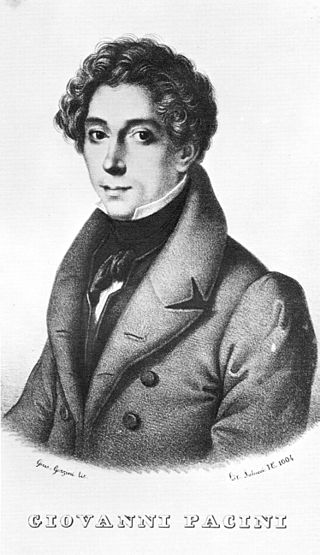
Giovanni Pacini was an Italian composer, best known for his operas. Pacini was born in Catania, Sicily, the son of the buffo Luigi Pacini, who was to appear in the premieres of many of Giovanni's operas. The family was of Tuscan origin, living in Catania when the composer was born.
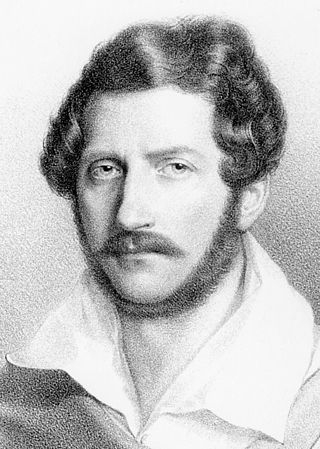
Pia de' Tolomei is a tragedia lirica in two acts by Gaetano Donizetti. Salvadore Cammarano wrote the Italian libretto after Bartolomeo Sestini's verse novella Pia de' Tolomei, which was based on Canto V, vv. 130–136 from Dante's narrative poem The Divine Comedy part 2: Purgatorio. It premiered on 18 February 1837 at the Teatro Apollo in Venice.
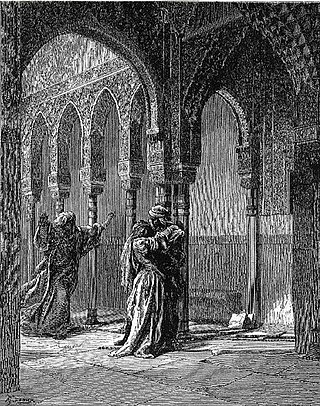
Zoraida di Granata is a melodramma eroico, in two acts by Gaetano Donizetti. The Italian libretto had been partly prepared by Bartolomeo Merelli, based on the French play, Gonzalve de Cordoue ou Grenade Reconquise by Jean-Pierre Claris de Florian (1791), and on a libretto by Luigi Romanelli to an opera by Nicolini called Abenamet e Zoraide.

L'esule di Roma, ossia Il proscritto is a melodramma eroico, or heroic opera, in two acts by Gaetano Donizetti. Domenico Gilardoni wrote the Italian libretto after Luigi Marchionni's Il proscritto romano, in its turn based on Louis-Charles Caigniez and Debotière's Androclès ou Le lion reconnaissant. It premiered on 1 January 1828 at the Teatro San Carlo, Naples.

Gemma di Vergy is an 1834 tragedia lirica in two acts by Gaetano Donizetti from a libretto by Giovanni Emanuele Bidera. It is based on the tragedy Charles VII chez ses grands vassaux(Charles VII and His Chief Vassals) (1831) by Alexandre Dumas père, which was later to become the subject of the opera The Saracen by the Russian composer César Cui.

Domenico Donzelli was an Italian tenor with a robust voice who enjoyed an important career in Paris, London and his native country during the 1808-1841 period.
Filippo Galli was an Italian opera singer who began his career as a tenor in 1801 but went on to become one of the most acclaimed basses of the bel canto era, with a voice known for its wide range, extreme agility, and expressivity, and a remarkable gift for acting.

Eugenia Tadolini was an Italian operatic soprano. Admired for the beauty of her voice and stage presence, she was one of Donizetti's favourite singers. During her career she created over 20 leading roles, including the title roles in Donizetti's Linda di Chamounix and Maria di Rohan and Verdi's Alzira. She was born in Forlì and studied music there and in Bologna before making her debut in Florence in 1828. She sang in all of Italy's leading opera houses, as well as in Paris, Vienna, and London before retiring from the stage in 1852. She spent her remaining years first in Naples, where she had been the Teatro San Carlo's reigning prima donna for many years, and then in Paris, where she died of typhoid fever at the age of 63. From 1827 to 1834, she was married to the Italian composer and singing teacher, Giovanni Tadolini.
Raffaele Mirate was a celebrated Italian operatic tenor who had an active career from the 1830s through the 1860s. Known for his intelligent phrasing and bright and powerful vocal timbre, he was regarded as an outstanding interpreter of the tenor roles in the early and middle period operas of Giuseppe Verdi. He notably created the role of the Duke of Mantua in the world premiere of Verdi's Rigoletto in 1851. He was also a highly regarded interpreter of bel canto roles, excelling in the operas of Vincenzo Bellini, Gaetano Donizetti, and Gioachino Rossini.
Giuseppe Fioravanti was an Italian opera singer active during the first half of the 19th century. Although one of the most important and popular basso buffos of his generation, there is only a relatively small amount of information available about his life. He had a highly fruitful partnership with the Teatro Nuovo in Naples and is best known today for creating roles in the world premieres of numerous operas by Gaetano Donizetti.
Giovanni Battista Verger was an Italian operatic tenor and impresario. He particularly excelled in the operas of Gioachino Rossini and Gaetano Donizetti.
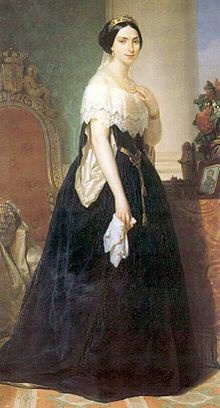
Adelaide Tosi was an Italian operatic soprano.
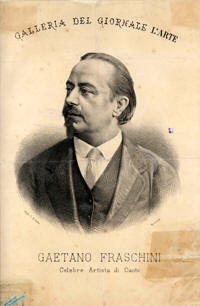
Gaetano Fraschini was an Italian tenor. He created many roles in 19th century operas, including five composed by Giuseppe Verdi. His voice was "heroic ... with a baritonal quality, ... yet Verdi and Donizetti appreciated his ability to sing softly and with subtlety." An Italian biographer has pointed out Fraschini's role in extending the longevity of Donizetti's operas, while at the same time accelerating the ascent of Verdi's repertory. He was indeed the most prominent singer who facilitated the transition from Donizetti to Verdi. Fraschini sang over one hundred roles and Verdi placed him at the top of his favorite tenors' list and described him as a "natural Manrico" for his Il trovatore. Fraschini also played a pivotal role in the success of many operas by Pacini and Mercadante.

Adelaide Borghi-Mamo was an Italian operatic mezzo-soprano who had an active international career from the 1840s through the 1880s. She was married to tenor Michele Mamo and their daughter, soprano Erminia Borghi-Mamo, also had a successful singing career.
Domenico Gilardoni (1798–1831) was an Italian opera librettist, most well known for his collaborations with the composers Vincenzo Bellini and Gaetano Donizetti.

Fanny Eckerlin (1802–1842) was an Italian mezzo-soprano who also sang contralto roles. During her career she was highly regarded, drawing favorable comparisons to Benedetta Rosmunda Pisaroni, but today she is remembered, if at all, for her association with the early career of Gaetano Donizetti, including creating the title role in his first publicly-performed opera, Enrico di Borgogna.
Savino Monelli was an Italian tenor prominent in the opera houses of Italy from 1806 until 1830. Amongst the numerous roles he created in world premieres were Giannetto in Rossini's La gazza ladra, Enrico in Donizetti's L'ajo nell'imbarazzo and Nadir in Pacini's La schiava in Bagdad. He was born in Fermo where he initially studied music. After leaving the stage, he retired to Fermo and died there five years later at the age of 52.

Luigi Pacini was an Italian opera singer who appeared on the principal stages of his native country as well as in Spain and Austria in a career that spanned over 30 years. He began his career as a tenor but in 1805 started singing bass roles and rose to prominence in that repertoire. Amongst the numerous roles he created in world premieres were Geronio in Rossini's Il turco in Italia and Parmenione in his L'occasione fa il ladro. Pacini was born in the Province of Pistoia and died in Viareggio where in his later years he taught singing at the conservatory founded by his son, Giovanni Pacini.
References
- ↑ Pacini, Giovanni, Le mie memorie artistiche, p. 34: Florence, 1865 (accessible for free on line in books.google)
- ↑ Weinstock, Herbert, Donizetti, pp. 26–27: New York, 1963
- ↑ Ashbrook, William, Donizetti and his operas, pp. 22–23: Cambridge, 1982
- ↑ Weinstock, p. 26 (note)